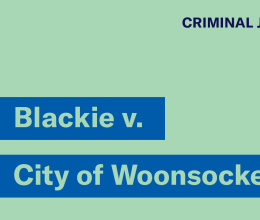The U.S. Court of Appeals in Boston today rejected the ACLU’s appeal of a racial profiling lawsuit brought on behalf of a 53-year-old African-American resident of Hopkinton, Bernard Flowers, who was stopped in his car and detained at gunpoint by Westerly police in 2000. By a 2-1 vote, the court, while calling it “a close case,” said that Westerly police had “reasonable suspicion” when they pulled Flowers over. The appeal was handled by ACLU volunteer attorney Thomas G. Briody.
Expressing “deep disappointment” at the decision, R.I. ACLU executive director Steven Brown said the ruling demonstrated the need for the passage of strong legislation in the General Assembly to address the problem of racial profiling. The ACLU and other civil rights groups unveiled such legislation at a news conference on Monday.
The incident leading to the lawsuit started with a report to Westerly police from a town resident. The resident claimed that someone had told him that a third person was going to send “two black males to his house with a gun.” The resident reported having seen a “small gray or black colored vehicle” occupied by “two black males” drive slowly by his home. He provided no other description of the men or the vehicle. Some thirty minutes later, Mr. Flowers was driving his gray car through town some two miles away from the scene of the report. Relying solely on that vague report, and despite the fact that Mr. Flowers was the only occupant in the car, police pulled him over and then executed what the police called a “felony car stop,” in which several officers pointed loaded weapons at him, handcuffed him and ordered him to his knees while his car was searched. Finding nothing, the police released him. Not only did the police offer no apologies, they would not even assist Mr. Flowers in trying to telephone his wife. Police then abandoned the search for the two mysterious “black males.”
ACLU attorney Briody said today: “I’m very disappointed, but it is clear that the court did not think much of the police work conducted that day.” ACLU executive director Brown said: “I find extremely troubling the Court’s view, in upholding the reasonableness of the stop, that the ‘car and driver substantially match[ed] the given description.’ To say that a description of two black men in a black or gray car served as a ‘substantial match’ to Mr. Flowers shows how vulnerable racial minorities are to being stopped and searched. We would never tolerate the use of such a vague and meaningless description to pull over white drivers. We are hopeful that this decision will serve as a call to the General Assembly to pass strong legislation to try to begin to deal with this serious problem of racial profiling.”








